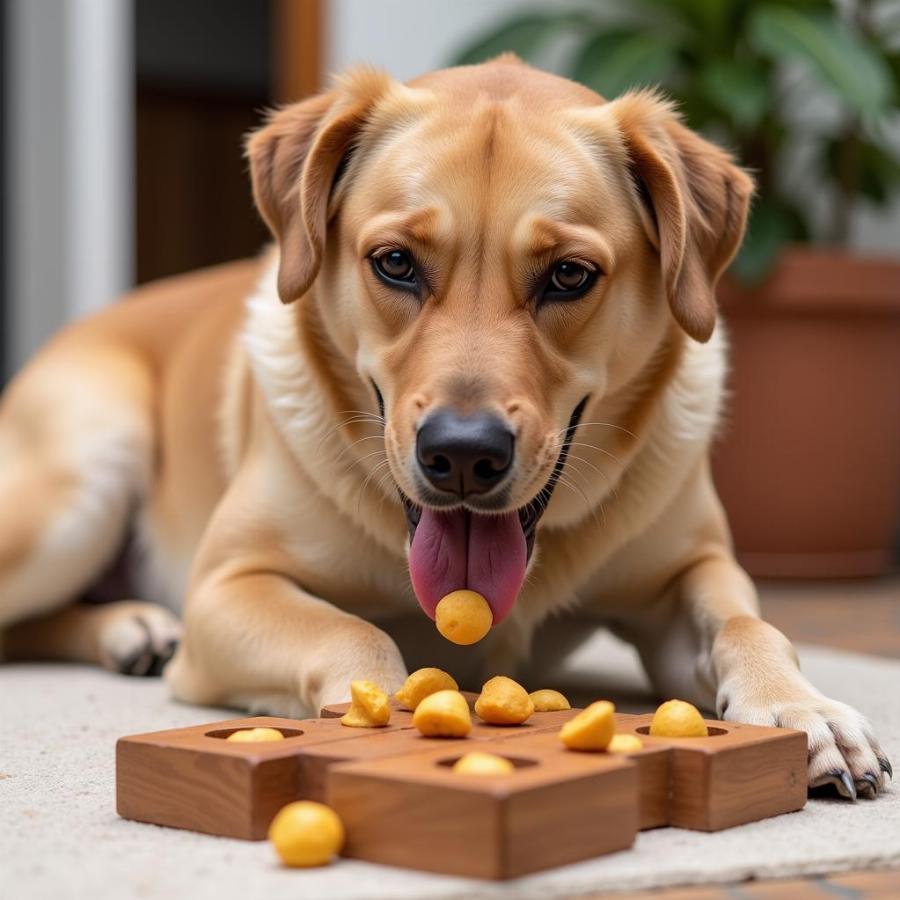A constantly hungry dog can be a puzzling and sometimes concerning issue for owners. While a healthy appetite is a good sign, insatiable hunger can indicate underlying medical conditions, behavioral issues, or simply a need for dietary adjustments. This article will explore the common reasons behind a dog’s persistent hunger and provide practical solutions on how to deal with a dog that is always hungry, ensuring your furry friend stays happy, healthy, and satisfied.
Understanding Your Dog’s Hunger
Before tackling the problem of a perpetually hungry pooch, it’s essential to understand the potential reasons behind their ravenous appetite. Is your dog truly hungry, or is something else going on? Let’s explore some possibilities.
Medical Reasons for Increased Appetite
Certain medical conditions can significantly increase a dog’s appetite. Diabetes, hyperthyroidism, and intestinal parasites are just a few examples. These conditions can interfere with nutrient absorption, leaving your dog feeling constantly hungry despite eating regular meals. If you suspect a medical issue, consult your veterinarian immediately for a proper diagnosis and treatment plan.
Dietary Deficiencies
Sometimes, a dog’s constant hunger stems from a lack of essential nutrients in their diet. A low-quality dog food might not provide the necessary calories and nutrients, leading to increased hunger. Similarly, a diet lacking in fiber can leave your dog feeling unsatisfied, prompting them to seek more food.
Behavioral Factors
Believe it or not, boredom and anxiety can also trigger excessive hunger in dogs. Just like humans, some dogs turn to food for comfort. If your dog is experiencing stress or lacks mental stimulation, they might be overeating as a coping mechanism.
Practical Tips for Managing Your Dog’s Hunger
Now that we’ve explored some of the underlying causes, let’s delve into practical solutions on how to deal with a dog that is always hungry.
Choose a High-Quality Dog Food
Investing in a high-quality, nutrient-rich dog food is crucial for satiating your dog’s hunger and ensuring they receive the necessary nutrients. what to feed a dog to gain weight provides helpful guidance on choosing appropriate dog food. Look for foods with high-quality protein sources, healthy fats, and plenty of fiber to promote feelings of fullness.
Feed on a Regular Schedule
Establishing a consistent feeding schedule can help regulate your dog’s appetite and prevent overeating. Divide their daily food allowance into two or three meals, and stick to the schedule as closely as possible. This helps prevent grazing and establishes a healthy eating pattern. You can learn more about feeding amounts in dog food amount by weight.
Incorporate More Fiber
Adding fiber to your dog’s diet can help them feel fuller for longer. You can achieve this by adding pumpkin puree, sweet potatoes, or green beans to their meals. Be sure to introduce these additions gradually to avoid digestive upset. For guidance on wet food portions, refer to how much canned dog food should i feed my dog.
Provide Mental and Physical Enrichment
A bored dog is more likely to overeat. Ensure your dog gets plenty of exercise and mental stimulation through walks, playtime, and interactive toys. A snuffle mat for large dogs can be a great way to provide mental enrichment during mealtimes. This keeps them engaged and prevents them from focusing solely on food.
 Providing Mental Enrichment for a Hungry Dog
Providing Mental Enrichment for a Hungry Dog
Monitor and Adjust Portions
Keep a close eye on your dog’s weight and adjust their food portions accordingly. If they’re gaining weight, slightly reduce their portions. If they’re losing weight, you might need to increase their portions or consult your veterinarian.
Why is my dog always hungry even after eating?
Even after a seemingly adequate meal, persistent hunger could be due to medical conditions, a nutrient-deficient diet, or behavioral issues like boredom or anxiety.
How can I tell if my dog’s hunger is excessive?
Indicators of excessive hunger include begging for food constantly, scavenging through trash, rapid weight loss or gain, and changes in behavior like restlessness or anxiety.
What if my dog is still hungry after increasing their food?
If increased food doesn’t satiate your dog’s hunger, a veterinary checkup is essential to rule out medical conditions or discuss potential dietary adjustments.
Conclusion
Dealing with a dog that is always hungry requires a holistic approach that considers medical, dietary, and behavioral factors. By understanding the potential causes and implementing the tips outlined in this article, you can help your furry friend achieve a healthy and satisfying eating pattern. Remember, consulting your veterinarian is crucial if you suspect any underlying medical issues or if your dog’s hunger persists despite dietary adjustments.
FAQ
- Is it normal for my dog to be hungry all the time? While a healthy appetite is normal, constant hunger can signal underlying issues.
- Can certain medications cause increased appetite in dogs? Yes, some medications can stimulate appetite as a side effect.
- How much fiber should I add to my dog’s diet? Consult your veterinarian for personalized recommendations.
- What are some signs of boredom in dogs? Excessive barking, destructive behavior, and restlessness can indicate boredom.
- How can I make mealtimes more engaging for my dog? Puzzle toys and slow feeders can add mental stimulation during meals.
- When should I be concerned about my dog’s hunger? If their hunger persists or is accompanied by other symptoms, consult your vet.
- Can anxiety cause increased hunger in dogs? Yes, just like in humans, anxiety can lead to changes in eating habits.
Further Reading
Beaut Dogs is your trusted source for comprehensive information on all aspects of dog ownership, from choosing the right breed to providing comprehensive care guides. When you need assistance, contact us at Email: [email protected], and Beaut Dogs will be happy to provide detailed and accurate answers. Visit https://beautdogs.com today to explore the wonderful world of dogs and learn how to best care for your canine companion!